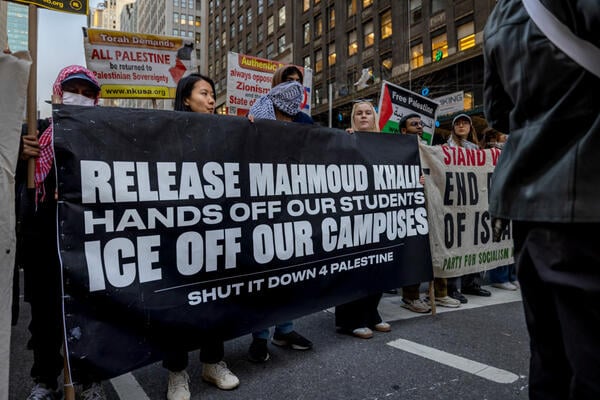Accusing the Trump administration of creating a “climate of repression and fear on university campuses,” two faculty groups sued the federal government Tuesday to stop the president’s efforts to deport noncitizen students and faculty who have participated in pro-Palestinian protests.
The Middle East Studies Association and the American Association of University Professors argue in the lawsuit that what they call Trump’s “ideological-deportation policy” violates the First and Fifth Amendments and the Administrative Procedure Act. They are asking a federal judge to rule that the policy is unconstitutional. This is the second lawsuit challenging the policy, though this legal action includes more faculty and students.
The litigation comes after immigration officers have, over the past month, targeted international students and postdoctoral fellows for alleged participation in pro-Palestinian protests, raiding their dorm rooms and revoking their visas.
Tuesday afternoon, a federal judge blocked the Trump administration from deporting a Columbia student, who moved to the United States from Korea when she was 7 but is now a legal permanent resident. The New York Times reported that the government argued Yunseo Chung’s “presence in the United States hinders the administration’s foreign policy goal of stopping the spread of antisemitism.”
But the judge said Tuesday that “nothing in the record” showed that Chung posed a “foreign-policy risk,” according to the Times.
Chung has not yet been detained. She’s just the latest student to come under fire from the administration’s crackdown on those who protested the Israel-Hamas war. That crackdown has included revoking the visas of students and faculty, giving universities names of students to target, and a social media surveillance program, according to the AAUP lawsuit.
The MESA and AAUP lawsuit, filed in the U.S. District Court of Massachusetts, specifically cites the cases of Chung; Badar Khan Suri, a Georgetown University postdoc; and Mahmoud Khalil, a recent Columbia University graduate. Judges have also blocked the government from deporting both men.
“While President Trump and other administration officials have described pro-Palestinian campus protests as ‘pro-Hamas,’ they have stretched that label beyond the breaking point to encompass any speech supportive of Palestinian human rights or critical of Israel’s military actions in Gaza,” the suit says. “They have left no doubt that their new policy entails the arrest, detention and deportation of noncitizen students and faculty for constitutionally protected speech and association.”
Attorneys from the Knight First Amendment Institute at Columbia are among the lawyers representing the scholarly groups.
MESA and the AAUP—along with the AAUP chapters at Harvard, New York and Rutgers Universities—filed the suit against the federal government, Trump, Secretary of State Marco Rubio, Homeland Security secretary Kristi Noem and Immigration and Customs Enforcement acting director Todd Lyons, plus their agencies.
A DHS spokesperson said in a statement that “taking over buildings, defacing private property, and harassing Jewish students does not constitute free speech.”
“It is a privilege to be granted a visa to live and study in the United States of America,” the spokesperson added. “When you advocate for violence and terrorism that privilege should be revoked, and you should not be in this country.”
The White House provided a similar statement from a Justice Department spokesperson, who said, “This department makes no apologies for its efforts to defend President Trump’s agenda in court and protect Jewish Americans from vile antisemitism.”
Beyond the immediate implications for students and faculty who face deportation, the policy has a broader chilling effect on campus free speech, the lawsuit argues.
“Out of fear that they might be arrested and deported for lawful expression and association, some noncitizen students and faculty have stopped attending public protests or resigned from campus groups that engage in political advocacy,” the suit says. “Others have declined opportunities to publish commentary and scholarship, stopped contributing to classroom discussions, or deleted past work from online databases and websites. Many now hesitate to address political issues on social media, or even in private texts.”
The lawsuit adds the policy harms the plaintiff associations “because they are no longer able to learn from and engage with noncitizen members to the extent they once did, and because they have had to divert resources from other projects to address the all-too-real possibility that their noncitizen members will be arrested, imprisoned, and deported for exercising rights that the Constitution guarantees.”

